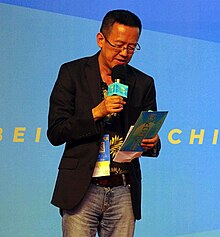Han Song (writer)
Han Song | |
|---|---|
 | |
| Native name | 韩松 |
| Born | 1965 (age 58–59) Chongqing, China |
| Occupation | Editor |
| Language | Chinese |
| Notable awards | Galaxy Award (six times) |
Han Song (韩松, born 1965) is a Chinese science fiction writer and a state journalist at the Xinhua News Agency.
Life
[edit]Born 1965 in Chongqing, Han works as a journalist for the state news agency Xinhua.[1] His first short story collection, Gravestone of the Universe (宇宙墓碑) was published in 1981 in the Taiwanese journal Huanxiang. It waited ten years for publication in the People's Republic of China because publishers found its tone too dark.[2]
Han has received the Chinese Galaxy Award for fiction six times. The LA Times described him as China's premier science fiction writer.[3]
Work
[edit]According to the China Daily, Han describes himself as a "staunch nationalist at heart", and his work is critical of China's desire to Westernize as fast as possible: He believes that "fast-track development does not agree with core Asian values", and that adoption of the "alien entities" of science, technology and modernization by the Chinese will turn them into monsters.[4]
According to the Los Angeles Times, "if the author is critical of a cocky America, he is also unafraid to ruthlessly satirize an overreaching China." Most of his works are banned in mainland China.[3]
Bibliography
[edit]Novels
[edit]Han's novels include among many others:[1]
- My Homeland Does Not Dream, whose subject is the state drugging people so that they work while sleeping.[3]
- 2066: Red Star Over America (2000), describing the collapse of the United States in a world dominated by China.[3]
- Red Ocean (2004)[5]
- Subway (2010), a novel of Chinese spacefarers returning to a post-apocalyptic Beijing subway.[4]
- Hospital Trilogy, original title 医院三部曲 (Pinyin yīyuàn sānbùqǔ):
- Hospital, original title 医院 (Pinyin yīyuàn), published in Chinese on June of 2016, published in English by Amazon Publishing on March 1 of 2023
- Exorcism, original title 驱魔 (Pinyin qūmó), published in Chinese in May of 2017, published in English by Amazon Publishing on November 28 of 2023
- Dead Souls, original title 亡灵 (Pinyin wánglíng), published in Chinese in May of 2018, planned to be published in English by Amazon Publishing on January 7 of 2025
A short story of Han's, The Wheel of Samsara, was published in English translation in the 2009 The Apex Book of World SF edited by Lavie Tidhar.[5]
Short stories
[edit]- "Tombs of the Universe" (宇宙墓碑), first published 1991 in Illusion SF, later published in the anthology Sinopticon, ISBN 978-1781088524
- "Submarines" (潜艇),[6] first published in Chinese on November 17, 2014 in Southern People Weekly, first published in English in the anthology Broken Stars, ISBN 978-1250297662
- "Salinger and the Koreans" (塞林格与朝鲜人),[7] first published in Chinese and English in 2016 in Tales of Our Time (故事新编), later published in the anthology Broken Stars, ISBN 978-1250297662
References
[edit]- ^ a b "Han Song interview". Time Out Beijing. March 2011. Archived from the original on 21 April 2014. Retrieved 26 March 2012.
- ^ Aloisio, Loïc. "Ma Patrie ne rêve pas - Une nouvelle politiquement incorrecte de Han Song 韩松". Retrieved 15 February 2019.
- ^ a b c d Sebag-Montefiore, Clarissa (25 March 2012). "Cultural Exchange: Chinese science fiction's subversive politics". Los Angeles Times. Retrieved 26 March 2012.
- ^ a b Basu, Chitralekha (18 March 2011). "The future is now". China Daily. Archived from the original on 22 March 2011. Retrieved 26 March 2012.
- ^ a b "A Martian In Tibet". io9. 7 January 2010. Retrieved 26 March 2012.
- ^ "Neue Storys aus China | Leseprobe aus U-Boote". Die Zukunft (in German). 2020-03-01. Retrieved 2024-09-29.
- ^ Han, Song. "Salinger and the Koreans" (PDF). guggenheim.org. Retrieved 2024-09-29.
